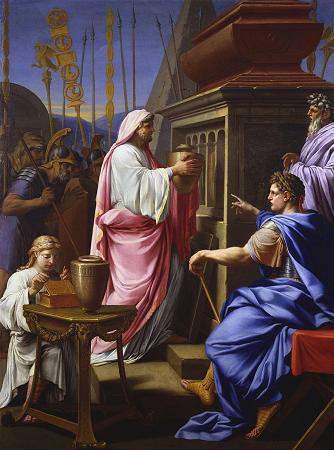Tiberius (-42 - 37). Tiberius was the second Roman emperor, reigning from AD 14 to 37. He succeeded his stepfather, Augustus. Born to Tiberius Claudius Nero and Livia Drusilla to a family of the noted patrician gens Claudia, he was given the name Tiberius Claudius Nero. His mother divorced Nero and married Octavian, later to ascend to Emperor as Augustus, who officially became his stepfather. Tiberius would later marry Augustus' daughter, Julia the Elder, and even later be adopted by Augustus. Through the adoption, he officially became a Julian, assuming the name Tiberius Julius Caesar. The emperors after Tiberius would continue this blended dynasty of both families for the following thirty years; historians have named it the Julio-Claudian dynasty. His relationship to the other emperors of this dynasty was as follows: He was the stepson of Augustus, grand-uncle of Caligula, paternal uncle of Claudius, and great-grand uncle of Nero. Tiberius' 22-and-a-half-year reign would be the longest after that of Augustus until that of Emperor Antoninus Pius, who surpassed his reign by a few months. Tiberius was one of the greatest Roman generals; his conquest of Pannonia, Dalmatia, Raetia, and parts of Germania laid the foundations for the northern frontier. Even so, he came to be remembered as a dark, reclusive and sombre ruler who never really desired to be emperor; Pliny the Elder called him the gloomiest of men. After the death of his son Drusus Julius Caesar in AD 23, Tiberius became more reclusive and aloof. In 26 AD he removed himself from Rome and left administration largely in the hands of his unscrupulous Praetorian prefects Lucius Aelius Sejanus and Quintus Naevius Sutorius Macro. When Tiberius died, he was succeeded by his grand-nephew and adopted grandson, Caligula. Tiberius was born in Rome on 16 November 42 BC to Tiberius Claudius Nero and Livia. In 39 BC his mother divorced his biological father and, though again pregnant by Tiberius Nero, married Gaius Julius Caesar Octavianus. In 38 BC his brother, Nero Claudius Drusus, was born. Little is recorded of Tiberius' early life. In 32 BC Tiberius, at the age of nine, delivered the eulogy for his biological father at the rostra. In 29 BC, he rode in the triumphal chariot along with his adoptive father Octavian in celebration of the defeat of Antony and Cleopatra at Actium. In 23 BC Emperor Augustus became gravely ill, and his possible death threatened to plunge the Roman world into chaos again. Historians generally agree that it is during this time that the question of Augustus' heir became most acute, and while Augustus had seemed to indicate that Agrippa and Marcellus would carry on his position in the event of his death, the ambiguity of succession became Augustus' chief problem. In response, a series of potential heirs seem to have been selected, among them Tiberius and his brother Drusus. In 24 BC, at the age of seventeen, Tiberius entered politics under Augustus' direction, receiving the position of quaestor, and was granted the right to stand for election as praetor and consul five years in advance of the age required by law. Similar provisions were made for Drusus. Shortly thereafter Tiberius began appearing in court as an advocate, and it was presumably at this time that his interest in Greek rhetoric began. In 20 BC, Tiberius was sent east under Marcus Vipsanius Agrippa. The Parthian Empire had captured the standards of the legions under the command of Marcus Licinius Crassus, Decidius Saxa, and Mark Antony. After a year of negotiation, Tiberius led a sizable force into Armenia, presumably with the goal of establishing it as a Roman client state and ending the threat it posed on the Roman-Parthian border. Augustus was able to reach a compromise whereby the standards were returned, and Armenia remained a neutral territory between the two powers. Tiberius married Vipsania Agrippina, the daughter of Augustus' close friend and greatest general, Marcus Vipsanius Agrippa. He was appointed to the position of praetor, and was sent with his legions to assist his brother Drusus in campaigns in the west. While Drusus focused his forces in Gallia Narbonensis and along the German frontier, Tiberius combated the tribes in the Alps and within Transalpine Gaul, conquering Raetia. In 15 BC he discovered the sources of the Danube, and soon afterward the bend of the middle course. Returning to Rome in 13 BC, Tiberius was appointed as consul, and around this same time his son, Drusus Julius Caesar, was born.
more...









